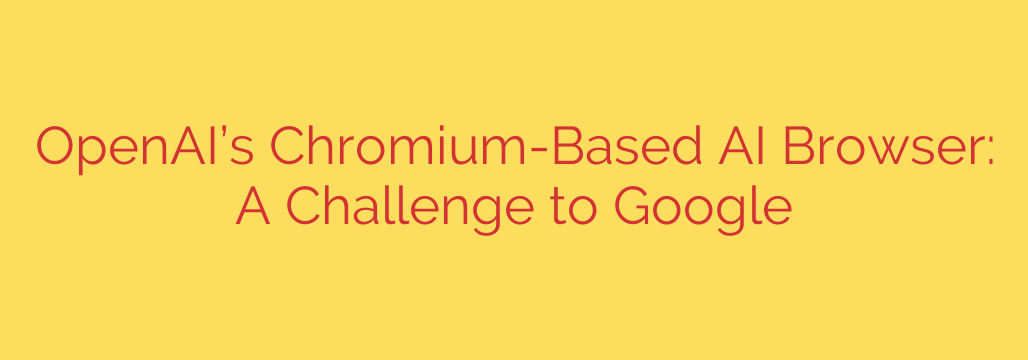
OpenAI Takes Aim at Google with a New AI-Powered Browser
The digital landscape is bracing for a potential earthquake. For decades, Google has been the undisputed king of web search and browsing, a gateway through which nearly all internet traffic flows. Now, a formidable challenger is emerging from the world of artificial intelligence. Whispers and evidence suggest that OpenAI, the creator of ChatGPT, is developing its own web browser, a move that could fundamentally reshape how we find and interact with information online.
This isn’t just about creating another Chrome alternative. This is about building an AI-native browser from the ground up, designed to integrate seamlessly with powerful language models. Such a development represents a direct challenge to Google’s core business and could usher in a new era of web navigation.
What We Know About the Rumored OpenAI Browser
While official details remain under wraps, information points to the development of a Chromium-based browser. Using Chromium, the same open-source foundation that powers Google Chrome, Microsoft Edge, and Brave, would allow OpenAI to accelerate development and ensure compatibility with the existing web.
The key differentiator, however, would be its deep integration with AI. Instead of a browser with an AI chatbot tacked on as a feature, imagine a browser where AI is the central operating system. This could mean a browsing experience that is inherently conversational, predictive, and personalized in ways current browsers can only dream of. This move is a logical next step for OpenAI, allowing them to control the entire user experience, from query to answer, without relying on a competitor’s platform.
Redefining the Search Experience
The most significant implication of an OpenAI browser is its potential to become a true Google Search competitor. For years, a “Google killer” has been the white whale of the tech industry, but no one has managed to unseat the giant. OpenAI’s approach is different because it doesn’t just aim to build a better list of blue links; it aims to change the entire paradigm of information discovery.
An AI-powered browser could offer:
- Conversational Search: Instead of typing keywords, you could ask complex questions in natural language and receive synthesized, direct answers compiled from multiple sources across the web.
- On-the-Fly Summarization: The browser could instantly summarize lengthy articles, research papers, or product reviews, saving you valuable time.
- Proactive Assistance: Imagine a browser that understands your task. If you’re planning a trip, it could proactively pull up flight options, hotel reviews, and potential itineraries without you even having to ask.
- Integrated Content Creation: The browser could help you draft emails, write code, or generate ideas directly within the interface, using the context of the pages you’re viewing.
This represents a fundamental shift from searching to accomplishing. It’s a move away from finding web pages toward finding solutions, a concept that strikes at the heart of Google’s search and advertising model.
What This Means for Your Digital Security and Habits
As we stand on the cusp of this new AI-driven web, it’s wise to be proactive. The introduction of a new, data-intensive browser raises important questions about privacy and user control. Here are a few security tips to keep in mind for the coming AI era:
- Be Mindful of Data Permissions: An AI browser will likely require access to your browsing history to provide personalized results. Be critical of the permissions you grant and understand what data is being collected and how it is being used.
- Fact-Check AI-Generated Answers: AI models can “hallucinate” or present false information confidently. Always treat AI-synthesized answers as a starting point, not the final word. Cross-reference critical information with trusted primary sources.
- Diversify Your Information Sources: Avoid relying on a single AI ecosystem for all your information. Continue to use and support a variety of browsers and search tools to ensure you are getting a well-rounded perspective.
The development of an OpenAI browser is more than just a new product launch; it’s a signal that the very fabric of the internet is changing. While Google’s position is deeply entrenched, the disruptive power of artificial intelligence is undeniable. The browser wars may have seemed over, but the war for the future of information access is just beginning.
Source: https://www.bleepingcomputer.com/news/artificial-intelligence/openai-prepares-chromium-based-ai-browser-to-take-on-google/








